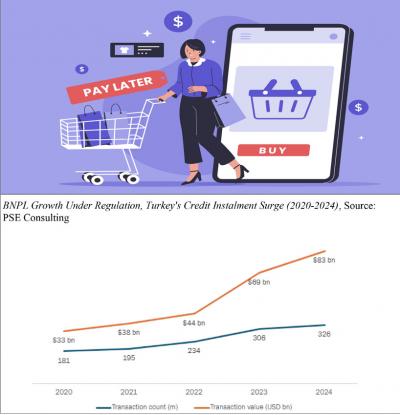The Green Sheet Online Edition
October 13, 2025 • 25:10:01
Why UK merchants will continue to offer BNPL post-regulation

Buy now, pay later (BNPL) has rapidly cemented its place in the UK retail landscape, fueled by consumers' growing appetite for flexible payment solutions. The appeal is clear: an easy, convenient way to spread costs over manageable installments.
However, this surge in popularity has also drawn increasing regulatory scrutiny, with rising concerns around consumer protection and default rates. From 2026, new rules will require BNPL providers to conduct mandatory affordability checks and deliver greater transparency for shoppers (see bit.ly/4nVwhGH).
That said, these changes are unlikely to derail BNPL's momentum. For merchants, continuing to offer BNPL remains an easy decision. Even under tighter regulation, the advantages, from boosting order values and improving conversion rates to shifting repayment risk, make it a powerful tool for driving growth.
Regulation, not restriction
The UK's upcoming BNPL regulations will introduce mandatory affordability checks for all customers, even those borrowing as little as £50. This marks a shift away from the largely self-regulated framework that has defined the BNPL market so far, signaling heightened concern over rising debt levels and consumer protection. The reforms aim to improve transparency, encourage responsible lending, and safeguard financial well-being.
Yet, while these changes are significant, they're unlikely to cause major disruption to the BNPL landscape. One key reason is that many BNPL customers are already accustomed to the process. Most users have previously undergone affordability assessments when opening their accounts, meaning the additional checks are unlikely to create noticeable friction.
The Financial Conduct Authority (FCA) estimates that around 11 million UK adults (see bit.ly/3IBhUsk) used BNPL services in the year leading up to May 2024, roughly one in five shoppers.
Klarna alone has more than 11 million active UK customers (see bit.ly/3KsfBbK) with around 70 percent making repeat purchases within a year (see bit.ly/42NrwXI). For these frequent users, the required checks have already been completed, ensuring minimal impact on their buying experience.
Minor friction, major rewards
For retailers, the appeal of BNPL has always been clear: higher average order values, stronger conversion rates and a smoother checkout experience that keeps cart abandonment low. On top of that, repayment risk typically sits with the BNPL provider rather than the merchant, making it a low-risk, high-reward offering.
However, the introduction of mandatory affordability checks could introduce small bumps in the road. Verifying new customers may slightly slow the checkout process, which could reduce BNPL adoption. And if conversion rates dip, the 2 to 6 percent processing fees charged by BNPL providers could become harder to justify.
Even so, BNPL's value for merchants remains compelling. The vast majority of transactions (more than two-thirds) are expected to pass through without any disruption. For most customers, the experience will stay quick and seamless, meaning the uplift in order values and conversions should far outweigh the minimal friction introduced. In short, the benefits still heavily outweigh the risks.
BNPL thrives under scrutiny
Turkey provides a compelling case study of how BNPL can flourish under tighter regulatory scrutiny. In 2022, Turkish regulators introduced stricter affordability checks for credit-based installment payments, including category-specific caps and clearer lending rules. The aim was simple: protect consumers and encourage responsible borrowing.
But instead of slowing down, the market surged. According to PSE Consulting's data, credit card installment transactions in Turkey jumped from 181 million in 2020 to a projected 326 million by 2024. Over the same period, the total value of these transactions more than doubled, rising from $33 billion to $83 billion.
This growth stems from how regulation was applied. In Turkey, most BNPL transactions run through established credit card infrastructure, meaning returning customers experience the same smooth, familiar checkout process. Compliance happens in the background, ensuring stronger consumer protection without adding friction, a balance that benefits both shoppers and merchants.
Brazil tells a similar story. With a regulated, card-based BNPL framework in place for decades, adoption remains strong and consistent.
For UK merchants, the takeaway is clear: smart regulation doesn't have to hinder growth. When BNPL is integrated into trusted payment systems and designed for repeat use, it can continue to thrive—even under a stricter regulatory environment.
What this means for merchants
For merchants, the key concern is whether upcoming regulations will make BNPL less appealing at checkout. The short answer: unlikely. Most BNPL customers are already pre-approved by their providers, so they won't encounter added delays when completing purchases. As long as demand for flexible payment options stays high, merchants have every reason to keep BNPL on the table.
The biggest shift will likely be in how the service is delivered rather than how it's experienced. For the vast majority of shoppers, BNPL will remain just as seamless and convenient as before. While the regulations introduce extra safeguards, they won't fundamentally change the customer journey, which means BNPL will continue to be a powerful tool for driving sales and enhancing the checkout experience. 
Stephanie Storry, a manager at PSE Consulting, specializes in payments innovation and emerging trends. She brings a background in market research and marketing consultancy, where she developed expertise in product innovation, strategic planning and go-to-market execution. At PSE, Stephanie supports the delivery of major client assignments and offers strong domain knowledge across open banking, buy now, pay later (BNPL), acquiring and embedded finance. PSE Consulting is a leading global provider of payment advisory services to players across the payments landscape. PSE's expertise has enabled it to deliver actionable market insights and operational optimization to senior payments leaders for over 30 years. To learn more, visit https://pseconsulting.com/
Notice to readers: These are archived articles. Contact information, links and other details may be out of date. We regret any inconvenience.





